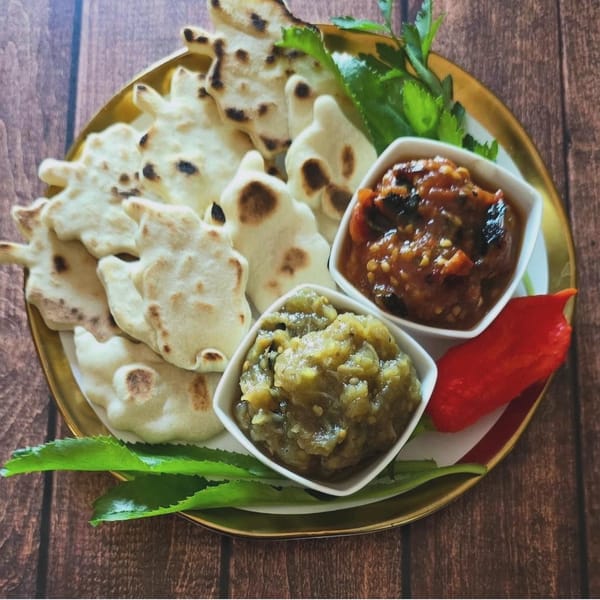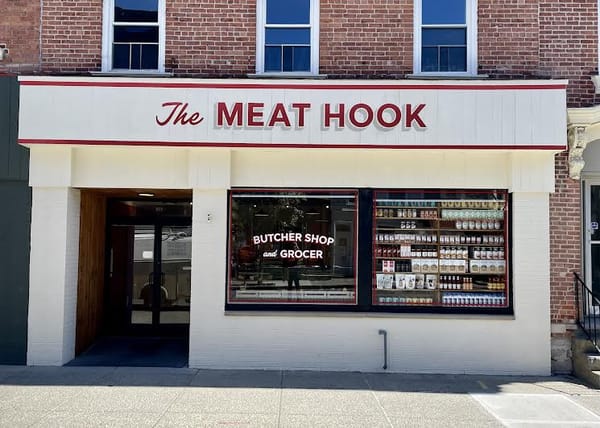
AgriCulture bloggers Peter Davies and Mark Scherzer are the owners of Turkana Farms in Germantown, NY. This week, Mark writes: Spring mud is still with us. The mud in front of the barn is proving a challenge for our oldest ewes, especially Marina, an eleven year old favorite of mine whom Peter sometimes refers to as "The Queen" because of her regal bearing and beautiful white top knot. Marina is one of our four "matriarchs", the original members of the flock, and she has bonded closely enough with me Peter also sometimes calls her my girlfriend. These days, at grain treat time, as the rest of the flock charges into the barn, Marina slogs through the mud one painstaking footstep at a time, before hesitating at the barn threshold, deciding whether it's worth the effort to jump in. All too often, her grain treat is hand fed, after the others have already devoured the contents of the feed bowls. The image of Marina's struggle is much in my mind as, for the third time since January, I find myself writing about the farm from the uncomfortable distance of Florida. My journey here was impelled by yet one more in a series of medical setbacks for my father, Felix, who in a few short months has endured two small amputations, a femoral bypass, kidney failure and now a fall, a broken hip, and hip replacement.

Just before I flew down, Felix told me by telephone that he would rather die than experience the pain he was then having. His desire seemed eminently reasonable to me, as I feel certain I would prefer death to a life in pain, restricted from eating the foods I like, unable because of blindness, deafness and the inability to walk to engage in the activities that make life worthwhile for me. I dread the indignity of dependency, even if it is wrapped in a euphemistic nicety like "assisted living." I would abhor spending three mornings a week hooked up to a dialysis machine. I admire people who derive meaning and joy from lives with even greater restrictions, but that's not me. I flew down to Florida fully expecting to be saying my final good-bye. Upon my arrival I was relieved to find Felix, ever the resilient survivor, already back in his normal, feisty, assertive mode, flirting inappropriately with the physical therapist, suggesting we sneak him out of the health center for pizza or Indian food, and generally demanding that he receive the top notch service he believes he is paying for. When the speech therapist yelled into his hearing aid that she needed to evaluate his language and cognitive capacity, he devilishly responded to her in French. When she told him she couldn't understand what he was saying, he switched to German and then to Spanish before letting her do her job in English. Typical Felix. Delighted as I am that his will to live seems to have revived and my visit requires no difficult decisions, it is impossible in these circumstances to avoid contemplating the morbid question of when one has lived enough, and who gets to decide. Oddly, it helps to think about these issues not just as a personal matter but because I know that when I return to the farm this weekend I will face a similar set of decisions regarding Marina. Peter recently asked a fellow Karakul breeder, who really loves her sheep, what she does with her aged ewes. While visiting our farm she looked at Marina and told him that she thought it appropriate, when a ewe reached Marina's stage in life, to shoot her and bury her.

I felt great discomfort at this suggestion. I must recognize, as Peter keeps reminding me, that our sheep are not pets or members of the family. The purpose of our raising livestock is their economic contribution to the farm. We keep ewes principally to produce new lambs, something Marina has not done for the last three years. The farm simply could not sustain itself if it nurtured all its livestock to their natural deaths. But Marina has given us many good years of her productive life, and because she responds personally to me, considering her fate has become a more personal, familial kind of decision. As a consequence, I have been asking myself some of the same kinds of questions about Marina that I found myself considering in responding to my father. How much function has she lost? How much of life's pleasures are still available to her? She can still see, hear, and eat. She walks, but slowly, stiffly and with some difficultly. I think back to my mother's mother, who lived to over 100, and to our dear Sag Harbor neighbor, Winifred Thayer, who lived almost as long. Neither ever suffered severe illness. Both lived relatively independently until near the end, and both were well loved and cared for. I suspect that Marina's life might be the sheep equivalent of theirs, not a life that should be too hastily brought to a close. But then, as Peter keeps reminding me, I must recognize the profound differences between Marina and a human being. My father, as a human being, must be the master of his own fate. What matters is how he feels about the loss of his functions, and whether for him the pleasures he continues to derive from life exceed the pain. By the terms of our social contract, his current economic utility to others is not an issue, as he made that contribution during his many years of work, and paid in advance, so to speak, for all the medical benefits he is now receiving. Now, the only utility to others he must consider is the emotional connection he has with his companion, Roz, and his family and friends. And I'd like to think that if he determines that the pain of the next torturous medical procedure will exceed the benefit he is likely to derive from it, we will support him in his decision not to submit to it. My father can also articulate his desires, though relying on a person's statements on such issues is not without challenge. Yesterday, as I sat outside the physical therapy room waiting for Felix to emerge, I watched one of the therapists lift a none-too-happy looking woman out of her wheelchair and ask her to try walking to her room. She took five or six tiny steps holding on to her walker, then sat down in exhaustion. The therapist lifted her up again and she shuffled a few more steps as she reminded the therapist, "I write down on every single document 'do not resuscitate', but they keep giving me medicine to get me better." I could not tell whether she was being ironic or was seriously hoping for death. The therapist replied, "I think you're doing remarkably well, Mrs. E___, for 101." I was momentarily surprised, but no more enlightened. Her age seemed to make both the ironic and the literal interpretations of her comment equally plausible. Farm animals do not control their own fates. They have been bred and raised for our use. The functions that matter are those that serve the farm and their owners.

And farm animals cannot clearly articulate their desires. If we were to ask Marina whether her life is still worth living, what would she say? Is the stiff pain of her arthritis and her struggle through the mud counterbalanced by the joys of munching spring grass and soaking up the sun? Would she fear the potential pain of a coyote attack and being eaten alive, now that she's the slowest and most vulnerable member of the flock, more than the momentary pain of a bullet to the head? If she were able to answer, would the answer be ironic or sincere? The difficulty I'm having with Marina's fate may be a useful lesson on the dangers inherent in blurring the line between livestock and pet. We try to maintain this line in all kinds of ways, including avoiding naming animals we know are destined to go to market. It's harder to avoid developing relationships with breeding stock who may be with us for 10 or more years, but I'm now beginning to recognize that here, too, the line must be drawn. I know that our needs and priorities as farmers must ultimately prevail, but I'm still committed to making our decision with some sensitivity to Marina's best interests as well. It will be a difficult one. For the complete archive of past AgriCulture blogs, click here.








